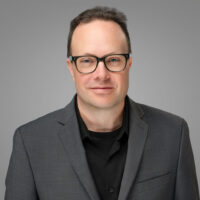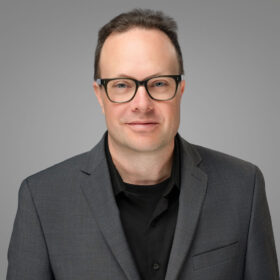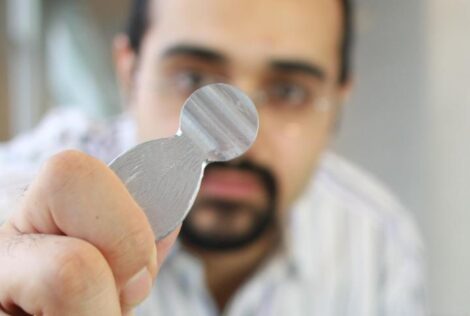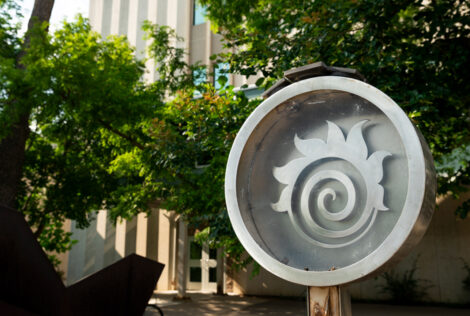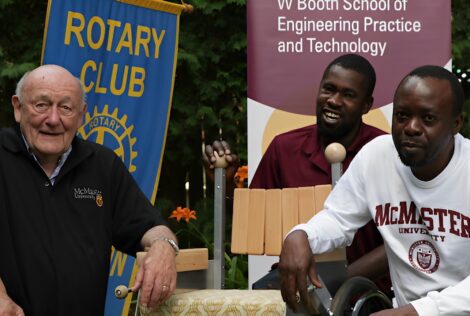
Expertise
Design thinking, human-centred design, design for health, wellness and aging, product design
Areas of Specialization
Research Clusters
-
Program Lead, M.Eng. Engineering Design
W Booth School of Engineering Practice and Technology
-
Associate Member
Mechanical Engineering
-
Professor
W Booth School of Engineering Practice and Technology
Other roles:
Co-Editor
International Journal for Students as Partners
Overview
Dr. Fleisig is a permanent teaching professor in the Walter G. Booth School of Engineering Practice and Technology (W Booth School) and Engineering 1 with a passion for inspiring empathy, creativity and interdisciplinary thinking in undergraduate and graduate students as well as in academic and local communities. Dr. Fleisig believes that for the university and graduates to make impactful contributions to society, it is no longer sufficient to only have disciplinary expertise. The ‘T-shaped’ graduate is one who is equally at home in the knowledge-centred work of their discipline (i.e., the stem of the ‘T’) and in work with individuals of diverse education, language, culture, beliefs, and values both within their organization and outside (i.e., the arms of the ‘T’). Key to his teaching are empathy, experience and reflection. In Dr. Fleisig’s first-year engineering course, undergraduate and graduate students from three faculties work together to create a device to help members of the local community with a complex and unique problem. In Dr. Fleisig’s graduate teaching at the W Booth School, his students work with university researchers, hospitals, and local business to identify important problems in health and sustainability to design, prototype, and implement innovative solutions that are meaningful to the community and have an economic impact.
Dr. Fleisig was awarded the 2017–2018 OCUFA (Ontario Confederation of University Faculty Associations) Teaching Award.
Did you know?
Dr. Fleisig has taught more than 10,000 undergraduate students and have impacted students across three faculties, local organizations, researchers, and a broad range of companies.
Dr. Robert Fleisig joined Publons on January 12th, 2018.
Relevant media:
High School Recruiting Video
PebblePad Webinar: The IMPACT Project: Authentic Learning by Design
Who I Am as a Teacher and How I Got to Be That Teacher
I graduated from an undergraduate program in mechanical engineering feeling that I was capable of a lot more than just seeing the world as an engineer. I don’t think there is anything wrong with being an engineer, but I felt I was had abilities and capacities that my undergraduate education had not even touched on. Through my graduate education I shifted my focus out of mechanical engineering into areas of research that were computer science applied to manufacturing engineering. Then I joined a dotcom start-up which for all intensive purpose was the equivalent of a fourth university degree. After being hired by McMaster University in a teaching role, I expanded my horizons even further by choosing to teach design thinking (aka human-centred design). This stretched my capabilities far beyond anything my previous experience had taught. I learned (and am still learning) new ways of doing, knowing, and being that are truly distinct from and complementary to my engineering training. From these experiences, I bring two things that matter most to me into my teaching practice: being [co-]creative and being a learner.
Learning to be a design thinker didn’t happen overnight. I spent many years learning from recognized creatives, reading, going to conferences, and doing. I first began doing by redesigning my first-year course taking it from an unpopular hodgepodge of topics to a project-based course involving designing for a real client working on a real-world problem. This was no small feat given a class of over 1000 recent high school graduates and no additional resources. It was an unqualified success which is still a surprise to me. I further extended this work by including the students of colleagues from the School of Rehabilitation Science and Department of Biology in the course. This partnership is still in place after over 10 years. This learning experience gives students the agency to be creative, work on a project in which they can reasonably be expected to produce meaningful work from which a community partner could benefit, and experience co-creating with others including non-engineers.
In the Master of Engineering Design (MED) program, I believe to teach design at a graduate level, the instructors must possess significant design skills themselves. Thus, I chose a route that is anything but conventional by asking students and are community partners to wrap their minds around learning to think in human terms about technology and engineering projects. At times, this has been a struggle as I’ve learned that I don’t have all the skills and knowledge needed and that I had to learn as my students learned. This has been made easier and project more meaningful by connecting with community, such as St. Joseph’s Healthcare Hamilton (SJHH), to work on projects that had both a technical component and a strong innovation or human component. Over time my understanding of what it means to design and to teach design has changed radically as has the nature of the projects in which students participate. One of my favourite initiatives, is the partnership with Patient/Family Advisors (PFAs) in which students put into practice their design thinking skills with a ‘safe’ group of users. The outcomes of this initiative taught me a great deal about working with community, teaching design, and about myself. Moving forward, I see the need for building a partnership between students, community, and faculty to ensure long-term, sustainable growth and benefits for all partners.
Teaching and practising design thinking has literally rewired a part of my brain. Newfound ways of thinking have led me to a renew interest in scholarly pursuits related to teaching and learning. Much of our teaching practice is implicitly instrumental and favours repeatability over growth. I believe that teaching practice could be reimagined as a partnership with students and community that builds-in growth: creativity, intellectual challenge, curiosity, testing and prototyping, focus on human values, etc.
B.A.Sc. (Waterloo); M.Eng. (McMaster); Ph.D. (McMaster), FCEEA
2019–2020 Faculty of Engineering, Faculty Leadership Fellow
2017–2018 OCUFA Teaching Award
Registered Professional Engineer in the Province of Ontario (P.Eng.)
MacPherson Leadership in Teaching and Learning Fellow 2016–2018
Winner of the 2015–2016 MSU Community Engagement Teaching Award
MIIETL Learning Portfolio Fellow 2015
2015 Woodbridge Award for Best Video at the 2015 AUTO21 Annual Conference
2014 President’s Award for Outstanding Contributions to Teaching and Learning
2013 Woodbridge Award for Best Video at the 2013 AUTO21 Annual Conference
Selected
Sean Park and Robert Fleisig
Intro to Design Thinking Part 3 with Robert Fleisig
Teresa Chan, Robert Fleisig, Ruth Chen
Design Thinking with Dr. Fleisig | Nursing Education & Academic Leadership with Dr. Ruth Chen by MacPFD Spark Podcast
MACPFD – SPARK PODCAST – EPISODE 1
Fleisig, Robert, and Apatu, Emma
Creativity with Dr. Fleisig | Public Health Program with Dr. Emma Apatu
MACPFD SPARK PODCAST

